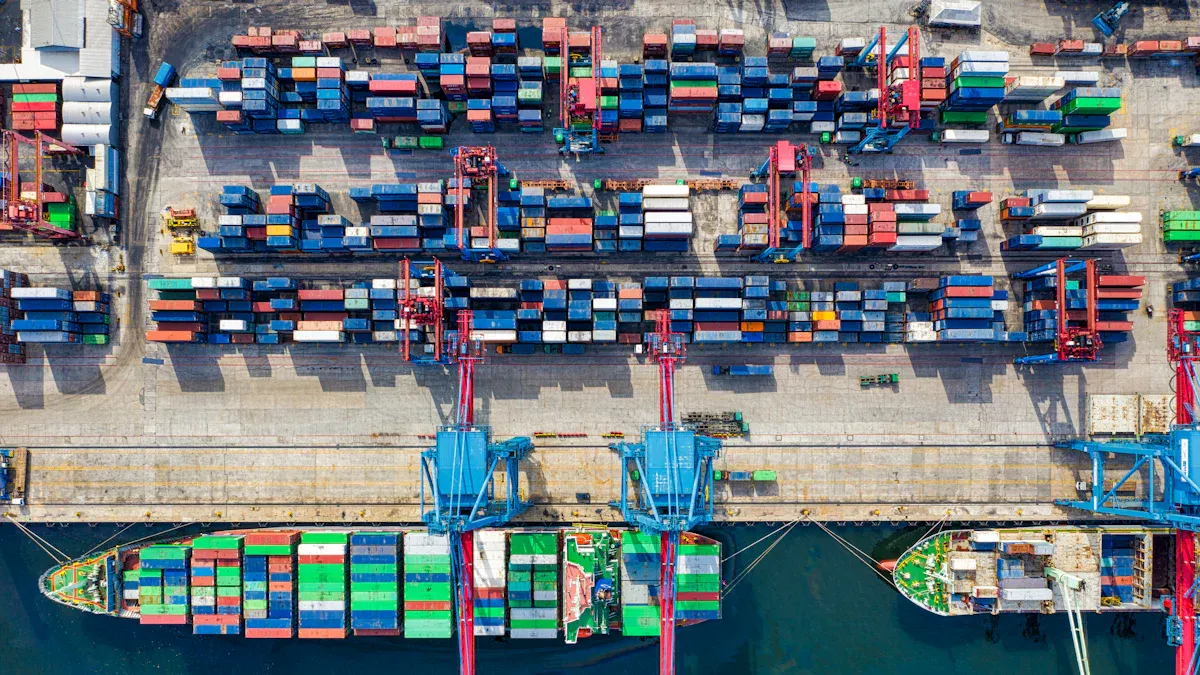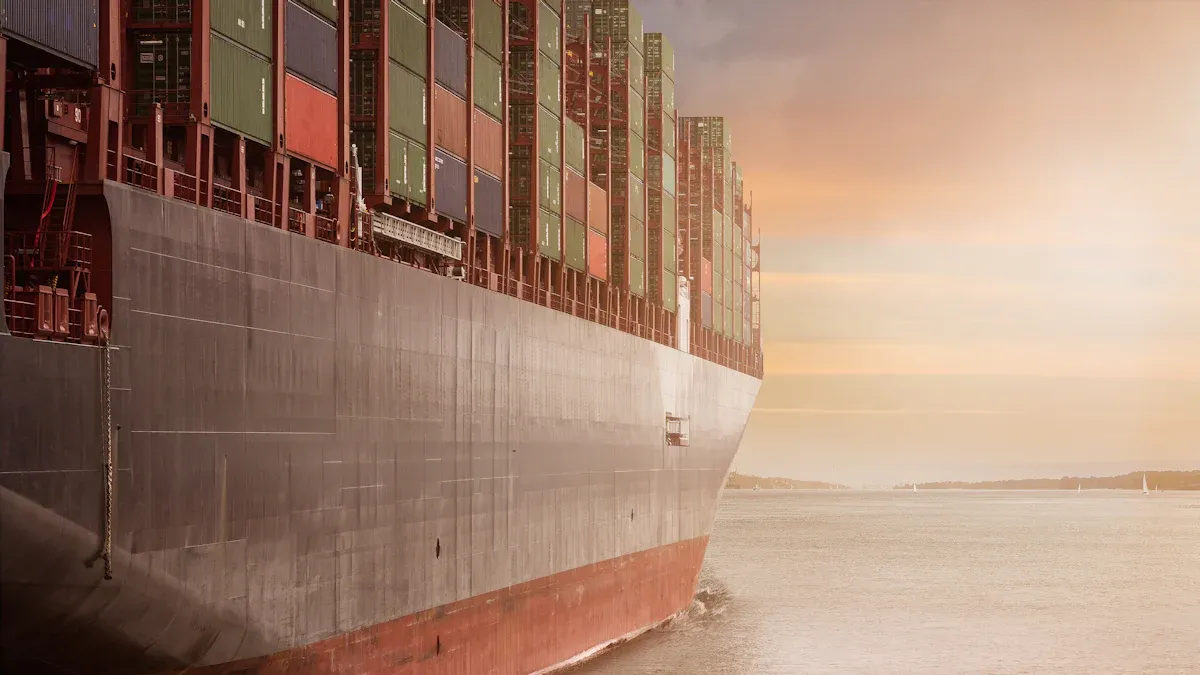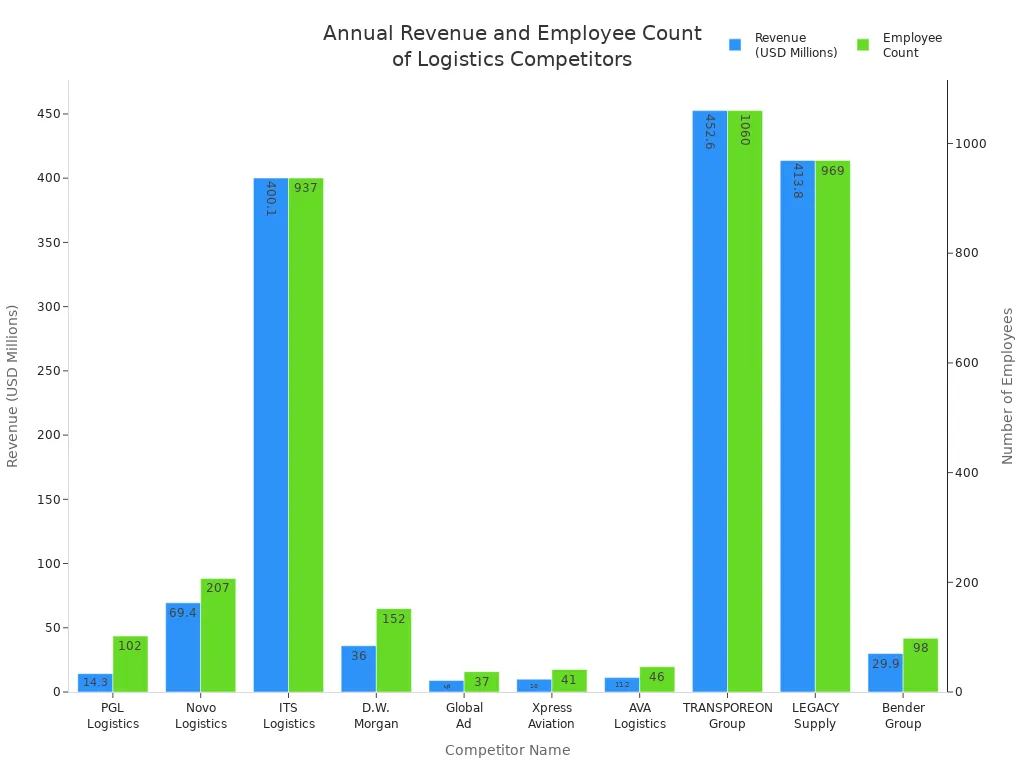Comparing PGL Logistics and Leading Competitors in 2025

You want a logistics partner that fits your business goals in 2025. When you look at pgl logistics vs competitors analysis, you see growing competition and rapid changes. Logistics providers face labor shortages, rising costs, and new sustainability targets.
Trend | Description |
|---|---|
Labor Shortages | Companies invest in automation to boost productivity. |
Rising Operational Costs | Firms upgrade supply chain tech to stay efficient. |
Sustainability Targets | Businesses change operations to meet new laws. |
Real-time Data Demands | You need visibility and data integration for better decisions. |
Tariff and Policy Changes | Shifting rules affect logistics strategies. |
You should compare providers based on your unique needs. |
Key Takeaways
PGL Logistics offers a wide range of services, including air freight, customs help, and warehousing, making it a versatile choice for various business needs.
Technology integration is crucial; PGL Logistics focuses on ongoing optimization and business intelligence to enhance supply chain operations.
When choosing a logistics partner, consider their industry expertise, reliability, and ability to customize services to fit your specific requirements.
PGL Logistics stands out for its strong customer support and commitment to flexibility, ensuring tailored solutions for different industries.
Evaluate competitors like DHL for global reach and advanced technology, but remember that PGL may provide more personalized service.
Company Overviews

PGL Logistics
You see PGL Logistics as a strong 3PL provider in 2025. The company operates over 1.5 million square feet of warehouse space in states like Texas, Illinois, Connecticut, Florida, New Jersey, Michigan, Arizona, California, Colorado, and Nevada.
PGL holds all federal certifications, which shows you their commitment to compliance and safety.
You can use their services for many industries, such as aerospace, telecom, hospitality, and retail.
PGL tailors logistics solutions to fit your business needs.
McLane Company
McLane Company stands out as a major supply chain services leader. You find them serving grocery stores, convenience stores, and restaurants across the United States. Their network covers thousands of locations. McLane focuses on foodservice and grocery distribution, making them a top choice for businesses in those sectors.
Home Depot Distribution Center
Home Depot Distribution Center supports one of the largest home improvement retailers in the world. You benefit from their advanced distribution systems and fast delivery. Their centers handle large volumes of building materials, tools, and home goods. Home Depot’s logistics help stores and customers get products quickly.
AmeriPac
AmeriPac offers you contract packaging and fulfillment services. They work with health, beauty, and consumer goods brands. AmeriPac helps you with packaging, assembly, and shipping. Their focus on quality control and flexibility makes them a good partner for companies needing custom packaging.
DHL
DHL gives you global logistics and express shipping. You can reach over 220 countries with their network. DHL uses advanced technology for tracking and delivery. They serve many industries, including e-commerce, healthcare, and manufacturing.
Other Notable Competitors
You have many other choices in the logistics market. Companies like Allcargo Logistics, Aeronet, Langham Logistics, R2 Logistics, Ware2Go, ContainerPort Group, McCollister's Global Services, AFS Logistics, Rhee Bros, Paramount, and Yusen Logistics all offer specialized services.
C.H. Robinson has received 10 recent awards, showing strong industry recognition.
Here is a quick look at how PGL Logistics compares to some competitors in revenue and employee size:
Competitor Name | Revenue | Number of Employees |
|---|---|---|
PGL Logistics | 102 | |
Novo Logistics | $69.4M | 207 |
ITS Logistics | $400.1M | 937 |
D.W. Morgan Company | $36M | 152 |
Global Ad Distribution | $9M | 37 |
Xpress Aviation | $10M | 41 |
AVA Logistics | $11.2M | 46 |
TRANSPOREON Group | $452.6M | 1060 |
LEGACY Supply Chain Services | $413.8M | 969 |
Bender Group | $29.9M | 98 |

You can use this overview as a starting point for your pgl logistics vs competitors analysis.
pgl logistics vs competitors analysis

Service Range
When you compare service range, you see big differences between providers. PGL Logistics gives you a wide set of options. You can use air freight, contract logistics, cross-border services, customs help, ground and ocean transport, packaging, project management, supply chain solutions, trade show logistics, warehousing, and white glove services. This variety helps you handle many types of shipments and business needs.
Here is a table showing how service offerings stack up:
Company | Service Offerings |
|---|---|
PGL Logistics | Air freight, Contract logistics, Cross-border services, Customs services, Ground transport, Intermodal transport, Ocean transport, Packaging and crating, Project management, Supply chain solutions, Trade show logistics, Warehousing, White glove services |
McLane Company | Distribution and supply chain management |
Home Depot Distribution Center | Distribution and supply chain management |
AmeriPac | Distribution and supply chain management |
DHL | Global shipping and logistics services, partnerships to enhance offerings |
You get more choices with PGL Logistics than with McLane, Home Depot, or AmeriPac. DHL offers global reach, but PGL Logistics gives you more specialized services for your business.
Technology and Integration
Technology plays a big role in logistics today. You want a provider that uses smart tools and connects with your systems. PGL Logistics uses a holistic approach to supply chain insights. You get market analysis, procurement help, and business intelligence. They keep improving their supply chain operations so you can stay ahead.
Here is a table comparing technology and integration:
Feature/Capability | PGL Logistics | Redwood Logistics | Skipjack Logistics |
|---|---|---|---|
Business Model | Non-asset-based parcel service provider | Integrated parcel solution through LPaaS model | Not specified |
Focus Areas | Market analysis, procurement, business intelligence | Advanced analytics, real-time visibility | Not specified |
Integration Capabilities | Ongoing optimization of supply chain operations | Seamless multi-system connectivity | Not specified |
Technology Utilization | Holistic approach to supply chain insights | Operational automation components | Not specified |
PGL Logistics stands out for ongoing optimization and a broad focus on business intelligence. You benefit from their investment in innovation. For example, they have expanded warehouse operations in Grand Prairie, TX, adding 100,000 square feet. They also hired Kris Rostan as Director of Commercial Strategy, showing a focus on growth and technology.
Tip: You should ask your provider about their integration capabilities before you choose.
Network Reach
You want your logistics partner to reach your customers wherever they are. PGL Logistics operates over 1.5 million square feet of warehouse space in many states, including Texas, Illinois, Connecticut, Florida, New Jersey, Michigan, Arizona, California, Colorado, and Nevada. This large footprint helps you move goods quickly and efficiently.
DHL gives you access to over 220 countries. If you need global shipping, DHL is a strong choice. McLane Company and Home Depot Distribution Center focus on the United States. AmeriPac serves health, beauty, and consumer goods brands, mostly in the U.S.
PGL Logistics vs competitors analysis shows that PGL offers strong national coverage and growing international partnerships, such as their work with DHL Express.
Specialization
Specialization matters when you have unique needs. PGL Logistics tailors solutions for many industries. You can use their services for aerospace, automotive, construction, energy, healthcare, retail, e-commerce, and technology.
Here is a table showing industry specialization:
Industry | Description |
|---|---|
Aerospace | Tailored logistics solutions for aircraft components and critical materials. |
Automotive | Specialized logistics for the automotive sector. |
Construction | Logistics support for construction projects. |
Energy | Services tailored for the energy sector. |
Healthcare | Logistics solutions for healthcare and pharmaceuticals. |
Retail & E-commerce | Support for retail and online businesses. |
Technology | Logistics for high-tech and telecom industries. |
McLane Company specializes in grocery and foodservice. Home Depot Distribution Center focuses on home improvement. AmeriPac works with health and beauty brands. DHL serves many industries but may not offer the same level of customization as PGL Logistics.
Customer Support
Customer support can make or break your experience. PGL Logistics gives you tailored solutions and personal attention. You get help with compliance, safety, and special requests. Their recent partnership with DHL Express aims to deliver world-class logistics services that exceed your expectations.
DHL offers global support and advanced tracking. McLane Company and Home Depot Distribution Center focus on reliability for their sectors. AmeriPac provides flexible packaging and fulfillment support.
When you look at pgl logistics vs competitors analysis, you see that PGL Logistics invests in growth and innovation. Their expanded warehouse space and new leadership show a commitment to better service. You get a partner that listens and adapts to your needs.
Strengths and Weaknesses
PGL Logistics
You find that PGL Logistics stands out for its strong company culture and flexible services. The company values every team member and encourages growth. You see a focus on empowering women and supporting collaboration. These strengths help PGL deliver dependable and adaptable logistics solutions.
Strengths | Description |
|---|---|
Family Culture | You work with a team where everyone feels valued and recognized. |
Dependability | You can count on PGL to deliver on promises for clients and employees. |
Empowerment of Women | You notice PGL supports women in logistics and helps them succeed. |
Flexibility and Capability | You benefit from services that adapt to your changing needs. |
Collaboration | You experience teamwork at every level of the company. |
PGL also fosters an environment that encourages learning and growth. You see this in their training and support for employees.
However, PGL faces some challenges.
In recent years, PGL tried to expand by hiring key employees from a competitor’s Mexico Program. This move caused disruptions and raised questions about business practices. You may want to ask about transparency and long-term relationships when you consider PGL.
McLane Company
You see McLane Company as a giant in supply chain services. The company brings in $4,422 million in revenue and employs over 10,000 people. You benefit from their scale and reliability, especially if you work in grocery or foodservice. McLane’s large network helps you reach many locations quickly.
Strengths:
Large workforce and strong revenue
Reliable distribution for food and grocery
Consistent employee growth
Weaknesses:
Less flexibility for custom solutions
Focused mainly on food and grocery sectors
Home Depot Distribution Center
You rely on Home Depot Distribution Center for fast and efficient delivery of home improvement goods. The company supports a huge retail network and handles high volumes.
Strengths:
Advanced distribution systems
Strong support for retail stores and customers
Stable employee base
Weaknesses:
Limited to home improvement products
Less adaptable for other industries
AmeriPac
AmeriPac helps you with packaging and fulfillment, especially if you work in health, beauty, or consumer goods. The company has a smaller team but offers flexible services.
Strengths:
Custom packaging and assembly
Focus on quality control
Flexible for small and mid-sized brands
Weaknesses:
Smaller scale than larger competitors
Limited industry reach
DHL
DHL gives you global reach and advanced technology. You can ship to over 220 countries and track your shipments in real time.
Strengths:
Worldwide network
Strong technology for tracking and delivery
Serves many industries
Weaknesses:
May not offer the same personal touch as smaller providers
Standardized services may not fit every unique need
When you look at pgl logistics vs competitors analysis, you see that each provider has unique strengths and weaknesses. You should match these qualities to your business needs for the best results.
Choosing the Right Provider
Business Needs
You want a logistics partner that fits your business goals and daily operations. Start by looking at what your company needs most. Some businesses need fast delivery, while others need special handling or advanced tracking. You should match your needs with the provider’s strengths.
Here are some important points to consider:
Check if the provider’s services fit your company’s strategy, not just their standard offerings.
Look for a network that can handle changes in demand, both in size and location.
Make sure the provider uses technology that gives you real-time updates and helps you make quick decisions.
Choose a partner that can customize and scale their services as your business grows.
Reliability and reputation matter. Pick a provider known for keeping promises.
Good customer support and clear communication help solve problems fast.
Tip: Always ask about technology integration. This helps you track shipments and manage orders more easily.
Small and medium-sized businesses should focus on reliability, scalability, and the range of services. You want a partner who can grow with you and handle busy seasons. Make sure the provider understands your supply chain and offers the right technology.
Industry Considerations
Different industries have unique logistics needs. You should choose a provider with experience in your field. This helps you avoid common problems and meet industry standards.
Industry | Key Logistics Requirements |
|---|---|
Healthcare | Temperature control, strict regulations, urgent deliveries |
Retail | Inventory management, customer demand, standard delivery times |
Manufacturing | Supply chain efficiency, safety standards, coordination of raw materials and finished goods |
If you work in healthcare, you need a provider who can handle sensitive products and follow strict rules. Retailers need strong inventory systems and fast shipping. Manufacturers need partners who can keep production running smoothly.
Note: The right provider will understand your industry’s challenges and help you meet your goals, no matter your company’s size.
You now see that PGL Logistics offers flexible services and strong customer support, while competitors like DHL provide global reach and advanced technology. Each provider has unique strengths and weaknesses. To choose the right partner, follow these expert tips:
Check for advanced technology and real-time tracking.
Make sure the provider can scale and adapt to your needs.
Avoid common mistakes such as inadequate planning or using outdated technology. For deeper evaluations, review security capabilities and discuss credentials with potential partners.
FAQ
What makes PGL Logistics different from other 3PL providers?
You get flexible services and personal support with PGL Logistics. The company adapts to your needs and offers solutions for many industries. You also benefit from their focus on technology and ongoing growth.
Can PGL Logistics handle international shipping?
Yes, you can use PGL Logistics for both national and international shipping. They partner with global companies like DHL Express. This helps you reach customers in many countries.
How does PGL Logistics support small businesses?
You receive tailored solutions that fit your business size. PGL Logistics helps you scale as you grow. You also get direct support and clear communication.
Tip: Ask about custom plans for your unique needs.
Which industries benefit most from PGL Logistics?
You see strong results if you work in aerospace, automotive, healthcare, retail, or technology. PGL Logistics builds solutions for many sectors. You can ask about their experience in your industry.
How do I choose between PGL Logistics and a global provider like DHL?
You should look at your shipping needs. If you want global reach, DHL offers strong coverage. If you need flexible, custom solutions and personal support, PGL Logistics may fit better.
See Also
PGL's Proficiency in Worldwide Logistics and Supply Chain Solutions
PGL Enhances West Coast Trucking Efficiency for Today's Supply Chains
PGL's Warehousing Services as Key Logistics Centers in Major Cities
New Trends in Logistics Industry Influencing Future Developments
PGL's Knowledge in Less Than Truckload and Full Truckload Shipping
